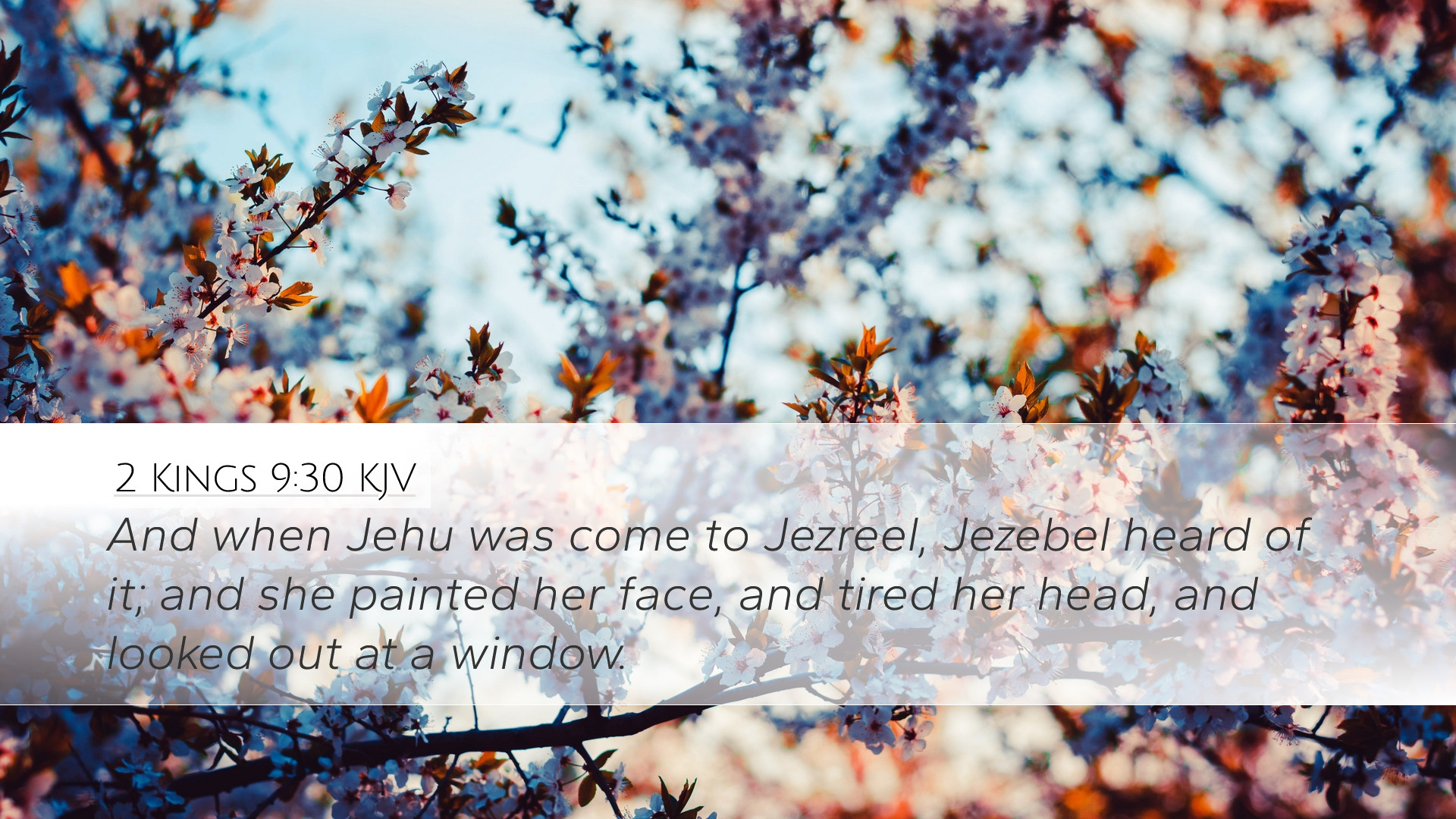Commentary on 2 Kings 9:30
Verse: “And when Jezeus was come to Jezreel, Jezebel heard of it; and she painted her eyes, and adorned her head, and looked out at a window.”
Introduction
The narrative surrounding 2 Kings 9:30 marks a significant intersection of politics, prophecy, and personal character. This verse initiates the climactic confrontation between Jehu, the newly appointed king of Israel, and Jezebel, the notorious queen whose influence had led Israel into idolatry and moral decay. The actions of Jezebel as she prepares to confront Jehu reveal much about her character and the cultural practices of the time.
Historical Context
Jezebel was a Phoenician princess who married King Ahab of Israel. Her introduction into the Israelite narrative brought with it an infusion of Baal worship and a marked shift in the religious practices of the nation. Following Ahab’s death, her death became imminent as Jehu rose to power, fulfilling the prophetic judgment pronounced against the house of Ahab (1 Kings 21:21).
The Irony of Jezebel’s Actions
In this verse, we see Jezebel’s unique response to the threat Jehu poses. According to Matthew Henry, “Her painting of her eyes and adorning her head signify her defiance; she still sought to uphold her queenly dignity even in the face of danger.” This outward display serves as a defense mechanism, illustrating her unwillingness to concede defeat. It mirrors the societal norms of a royal woman of her status, reinforcing the themes of pride and rebellion which characterize her life.
Jezebel and Her Influence
Adam Clarke emphasizes that Jezebel sought not only to beautify herself but to present a façade of control and power. By adorning herself, she attempts to project an image of confidence, perhaps thinking she could use her status and charm to sway Jehu or manipulate the situation in her favor.
- Psychological Insight: Her behavior can be seen as a desperate attempt to regain control, illustrating the desperate measures the powerful may resort to when threatened.
- Symbolism of Preparation: The act of preparing oneself can symbolize a deeper spiritual and psychological readiness for confrontation, even if it is rooted in denial.
Theological Implications
The theological implications of this moment are profound. Jehu's ascendance is not merely a political maneuver; it represents the fulfillment of divine judgment against the practices of idolatry and moral corruption in Israel. Albert Barnes notes, “Jezebel's adornment also serves as a stark contrast to her inner corruption; her external beauty masked a heart aligned against God.” This juxtaposition is critical as it highlights the distinction between outward appearances and inward reality, a recurring theme throughout the Scripture.
Furthermore, this interaction can be viewed through the lens of judgment. Jezebel’s external display stands as an articulation of her life choices; she was fully aware of her impending doom, yet she chose to maintain her façade. The spiritual blindness she exhibited is a reminder of the dangers inherent in living a life divorced from godly principles.
Application for Believers
This passage provides essential lessons for contemporary believers:
- Appearance vs. Reality: It encourages a reflection on personal values and the importance of aligning one’s inner character with outward behavior. Believers are called to integrity.
- Confrontation of Evil: Just as Jehu confronts Jezebel, Christians are admonished to confront the evils within their own lives and society.
- God's Sovereignty: It reassures believers of God’s sovereign plan, as He raises up leaders and brings judgment against unrepentant hearts.
Conclusion
In summary, 2 Kings 9:30 exemplifies the tension between Jezebel’s bold defiance and the impending fulfillment of divine judgment. Her attempt to appear strong externalizes the inner turmoil of a heart set against God. The legacy of Jezebel serves as a cautionary tale for those who oppose God’s will and highlights the importance of authenticity in one’s walk of faith. For pastors, students, and scholars alike, this passage invites deeper reflection on the implications of leadership, idolatry, and the nature of sin.


